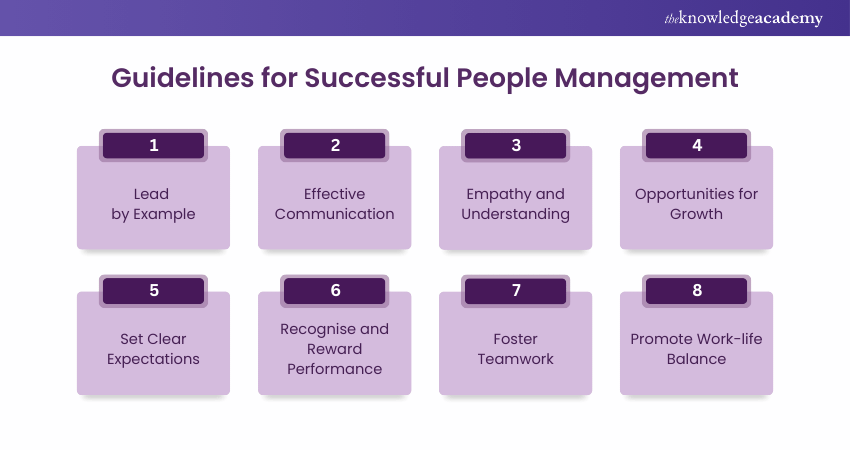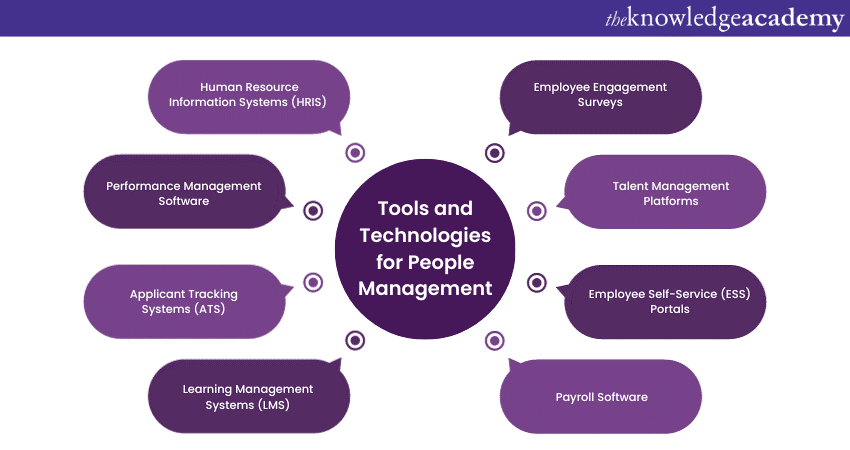We may not have the course you’re looking for. If you enquire or give us a call on +358 942454206 and speak to our training experts, we may still be able to help with your training requirements.
Training Outcomes Within Your Budget!
We ensure quality, budget-alignment, and timely delivery by our expert instructors.

Have you ever wondered what it takes to lead a team effectively and ensure every employee reaches their full potential? People Management, at its core, is about creating a work environment that empowers individuals, aligns their goals with the organisation’s objectives, and drives overall success. In this blog, we discuss What is People Management, breaking down its key components, processes, and tools to help you understand how it shapes productive and engaged workplaces. Let’s dive into the world of managing people effectively!
Table of content
1) What is People Management?
2) Why is People Management Important?
3) What are Some Key People Management Skills?
4) The Process of People Management
5) Guidelines for Successful People Management
6) What are the Most Common People Management Mistakes to Avoid?
7) Tools and Technologies for People Management
8) Conclusion
What is People Management?
People Management, often referred to as Human Resource Management (HRM) or Human Capital Management (HCM), is the strategic and systematic approach to managing an organisation's most valuable asset – its people. It involves all the activities, processes, and policies used to recruit, develop, motivate, and retain a talented and diverse workforce.
At its core, People Management is about creating an environment where employees can thrive, contribute to their full potential, and align their individual goals with the organisation's objectives. It includes a different range of responsibilities that aim to optimise human resources to achieve business goals.

Why is People Management Important?
People Management is crucial for several reasons:
Company Morale
When a team is poorly managed, it can lead to low morale, high turnover, and burnout. Good People Management, on the other hand, can make employees feel more responsible and satisfied with their jobs. A positive work environment leads to happier and productive employees, which shows in the quality of their work.
Productivity and Efficiency
Effective People Management involves organising your team to enhance productivity and efficiency. This means having the right employees, providing proper training, and working together to achieve goals. Successful managers help their teams focus on high-value tasks and align around common objectives.
Competitive Advantage
For small businesses, good People Management can provide a competitive edge. With limited resources, it's essential to maximise human capital and prioritise team coordination. This helps businesses compete with larger companies by making the most of their available resources.
Learn conflict resolution strategies with our Successful People Management and Team Leadership Course – Join today!
What are Some Key People Management Skills?
To excel in People Management, HR leaders need to develop the following skills:
a) Empathy: The ability to understand and share the feelings of others. This helps employees feel valued, improving decision-making and communication, and creating a better employee experience.
b) Leadership: This includes building trust, motivating team members, resolving conflicts, and empowering employees. Good leadership is essential for managing others effectively.
c) Organisation and Analytical Thinking: Modern HR requires a balance of soft skills and analytical abilities. HR professionals need to be tech-savvy and capable of data analysis to manage people effectively in today's workplace.
The Process of People Management
The process of people management involves a series of interconnected activities and functions aimed at attracting, developing, motivating, and retaining a talented and diverse workforce. Here's a breakdown of the key steps and components in the process of People Management:
Recruitment and Selection:
1) Identifying Needs: Understanding the organisation's workforce needs and the skills and attributes required for various positions.
2) Job Posting: Creating job descriptions and posting openings through various channels.
3) Screening and Interviews: Reviewing resumes, conducting interviews, and assessing candidates for their fit with the organisation.
4) Selection: Choosing the most suitable candidates and making job offers.
Onboarding and Orientation:
1) Orientation: Introducing new hires to the company culture, policies, and their specific job roles.
2) Training: Providing initial training to ensure employees are trained with the required skills to perform their duties effectively.
3) Integration: Encouraging a smooth transition into the organisation and helping new employees feel comfortable and welcomed.
Performance Management:
1) Goal Setting: Defining performance expectations and goals for employees.
2) Regular feedback: Providing continuous feedback and coaching to help employees improve and achieve their goals.
3) Performance Appraisals: Conducting formal performance evaluations and setting future objectives.
4) Rewards and Recognition: Recognising and rewarding outstanding performance.
Learn to streamline hiring processes with our Talent Acquisition Training – Join today!
Guidelines for Successful People Management
Here are some guidelines to help you excel in People Management:

a) Lead by Example: Show your team how to work hard and stay positive. Your actions will inspire them to do the same.
b) Effective Communication: Talk clearly and openly with your team. Listen to their concerns and keep them updated.
c) Empathy and Understanding: Understand that everyone has different needs and challenges. Be supportive and kind to your employees.
d) Opportunities for Growth: Provide training to help your team learn new skills. This helps them grow in their careers.
e) Set Clear Expectations: Make sure everyone knows their job roles and what is expected of them. Clear guidelines help avoid confusion.
f) Recognise and Reward Performance: Praise and reward good work. This can be through bonuses, promotions, or simple thank-yous.
g) Foster Teamwork: Encourage your team to work together. Good teamwork leads to better results.
h) Promote Work-life Balance: Help your team balance work and personal life. This prevents burnout and keeps everyone happy.
What are the Most Common People Management Mistakes to Avoid?
Avoiding common People Management mistakes is key to maintaining a motivated and engaged team. Here are five common mistakes to avoid, explained in simple language:
a) Poor Communication: Lack of effective and timely communication is likely to lead to misunderstandings and low morale. Communicate to your team or members all problems and goals to be achieved as well as the expectations and other changes to be made. Communication is two-way, so your team must feel free to come to you with their worries.
b) Micromanaging: Employees cannot innovate and be imaginative if every now and then a Supervisor or Manager checks up on them or micromanages their work. However, state your expectations clearly and ensure they receive all the assistance they require to achieve the goals that you set.
c) Ignoring Employee Feedback: Not listening to your team's feedback can discourage open communication. Actively seek out their suggestions, concerns, and ideas to create a more collaborative environment.
d) Playing Favorites: Treating some employees better than others can create resentment and division. Be fair and consistent with everyone, valuing each person's contributions equally. This is especially important in a hybrid work environment to avoid proximity bias.
e) Mishandling Conflicts: Avoiding or poorly managing conflicts can lead to tension and discord. Address issues promptly, fairly, and objectively to maintain a harmonious work environment.
Tools and Technologies for People Management
Here are some key tools and technologies for People Management:

1) Human Resource Information Systems (HRIS): HRIS software centralises HR data, making it easier to manage employee information, track performance, and automate administrative tasks.
2) Performance Management Software: These platforms facilitate goal setting, performance reviews, and feedback collection. They can help in setting and tracking performance objectives, providing continuous feedback, and assessing employee progress.
3) Applicant Tracking Systems (ATS): ATS software automates the recruitment process, making it easier to post job openings, review resumes, and schedule interviews.
4) Learning Management Systems (LMS): LMS software allows organisations to provide, manage, and track employee training and development programs.
5) Employee Engagement Surveys: These survey tools help measure employee engagement, gather feedback, and identify areas for improvement in the workplace.
6) Talent Management Platforms: Talent management software covers a range of HR processes, including recruitment, onboarding, performance management, and career development.
7) Employee Self-Service (ESS) Portals: ESS portals allow employees to access their HR information, submit leave requests, and update personal details independently, reducing administrative work for HR.
8) Payroll Software: Payroll systems automate salary calculations, tax deductions, and direct deposit, ensuring accurate and timely payment to employees.
Conclusion
Understanding What is People Management helps in leading and guiding employees to achieve organisational goals, ensuring a positive and efficient work environment. Effective communication, avoiding micromanagement, listening to feedback, treating everyone fairly, and handling conflicts well are essential practises. By following these guidelines, you can foster a happy and engaged team.
Learn the techniques for improving organisational performance with our Talent Management Training – Sign up now!
Frequently Asked Questions

Effective People Management creates a positive work environment where employees feel valued and motivated. This leads to job satisfaction, better teamwork, and a stronger overall company culture.

People analytics uses data to understand employee behaviours and needs. This helps Managers make informed decisions to improve employee engagement, performance, and retention.

The Knowledge Academy takes global learning to new heights, offering over 30,000 online courses across 490+ locations in 220 countries. This expansive reach ensures accessibility and convenience for learners worldwide.
Alongside our diverse Online Course Catalogue, encompassing 19 major categories, we go the extra mile by providing a plethora of free educational Online Resources like News updates, Blogs, videos, webinars, and interview questions. Tailoring learning experiences further, professionals can maximise value with customisable Course Bundles of TKA.

The Knowledge Academy’s Knowledge Pass, a prepaid voucher, adds another layer of flexibility, allowing course bookings over a 12-month period. Join us on a journey where education knows no bounds.

The Knowledge Academy offers various People Management Courses, including the Successful People Management and Team Leadership Course, Talent Acquisition Training, and Talent Management Training. These courses cater to different skill levels, providing comprehensive insights into Talent Acquisition vs Recruitment.
Our HR Resources Blogs cover a range of topics related to People Management, offering valuable resources, best practices, and industry insights. Whether you are a beginner or looking to advance your management skills, The Knowledge Academy's diverse courses and informative blogs have got you covered.
Upcoming HR Resources – Learn about Human Resources Batches & Dates
Date
 Introduction to Supervising a Team
Introduction to Supervising a Team
Fri 10th Jan 2025
Fri 14th Mar 2025
Fri 9th May 2025
Fri 11th Jul 2025
Fri 12th Sep 2025
Fri 14th Nov 2025







 Top Rated Course
Top Rated Course


 If you wish to make any changes to your course, please
If you wish to make any changes to your course, please


